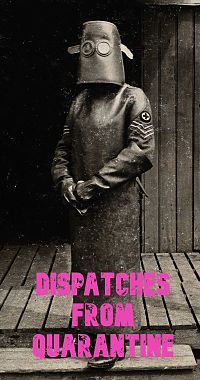 As unstructured day bleeds into unstructured day, this abundance of time is starting to feel more curse than blessing. The micro has become the macro in a blink of an eye and our apartments, houses, and rooms have become the entirety of our kingdoms. With work and all outside activities called off, the 432-square-foot studio I share with my partner and dog feels smaller each day, as we brush elbows loading and unloading the dishwasher for who-knows-the-number-of-times since we started our household quarantine two and a half weeks ago. This Californian winter is strangely more homebound than the ones of my childhood in Minnesota.
As unstructured day bleeds into unstructured day, this abundance of time is starting to feel more curse than blessing. The micro has become the macro in a blink of an eye and our apartments, houses, and rooms have become the entirety of our kingdoms. With work and all outside activities called off, the 432-square-foot studio I share with my partner and dog feels smaller each day, as we brush elbows loading and unloading the dishwasher for who-knows-the-number-of-times since we started our household quarantine two and a half weeks ago. This Californian winter is strangely more homebound than the ones of my childhood in Minnesota.
The perpetually open New York Times COVID-19 infection map and information tabs in my internet browser serve as a constant reminder of the magnitude of this crisis as I try to work or distract myself online. My newsfeed is similarly mired in personal and professional catastrophe. Theatres closing doors and laying off staff. People shut up in their houses unable to work or fleeing large, heavily infected cities to theoretically safer climes. Then there’s the ever-growing number of people testing positive and praying for mild trajectories. And the fact, without working myself, my own dwindling funds can only stretch so far.
Watching as prolific and stalwart theatres around the country close their doors breaks my heart, as I see my former and perhaps future artistic homes buckle under the crushing economic weight of the impending recession. As an early-career theatremaker, the ever-present fear that I will be forced into a different profession grows even more acute. The institutions where I looked to get my foot in the door are shuttered and their attention is paid to layoffs, not new hires. This isn’t even a question of finding jobs that will pay the bills anymore; it’s a question of where and if there will be any jobs at all when the nation’s theatre doors open again.

I wake up every day to worsening news and ask myself: What I can do to help nurse a gravely wounded field?
Now armed with the dubious gift of unlimited time, what is there to do?
The role of dramaturg is to be a great unifier in the theatre. The title’s definition is necessarily amorphous, since its required duties range from collaborative research to artistic mediator to developmental assistant to playwright cheerleader. For me, dramaturgy means acting as an artistic guide, a creative ally, and advocate from a play’s nascent development to full production.
So I read. I try and make a dent in the never-ending canon of plays I haven’t quite gotten to yet (I swear I was gonna get to The Iceman Cometh soon…). I’m trying to read, not out of a sense of productivity, but out of an obligation to build a skill set vast enough to feed my soul, build empathy, and serve future artistic projects. I am diving into academic texts that require a little extra time and attention. I am delving deeper into the bodies of work from writers I already admire, and I am looking for new artists to expand my library (New Play Exchange, my savior from isolation!).
Theatre is born of community, which is one of the only tools we can really leverage right now. I am taking this time to reconnect with my communities around the country and sharing in their pain. I reached out on social media and solicited new plays. I’ve been giving feedback on them, both to develop my own skills and to give back to playwrights, a group I cherish. I want us all to come out of this with a large repertoire of works ready to go, to begin to rehearse, to play, without prologue.
But I also know that productivity and the depths of grief don’t go hand in hand. Despite my hopes, I also recognize we could come out of this with nothing at all.
The thing that scares me most is the loss of spare resources for mentorship. When I was starting out, I benefited from generous mentorship and development in some incredible theatres, a privilege I couldn’t be more grateful for. I fear that in lean times these programs designed to help usher in the next generation of theatremakers won’t make the cut. And I am afraid the doors of our country’s small theatres, incubators of new plays, will shutter for good, forever changing the way a new generation of writers practice and develop work for regional stages.
But I also know that we as artists are constantly challenged to be resourceful. After all, the best theatre is, in fact, made during shortage. It is said that Shakespeare wrote King Lear during the plague, yes, but we also know that the transformative power of the theatre comes from belief in the brilliance of our colleagues, in ourselves, and in the power of the work we are doing. Belief that the slats of wood are the forest of Arden, that the player with the breastplate is Henry V, that the wooden sword he wields is real and dangerous.
Right now we are in an extended theatrical winter. An unseasonal, town-burying blizzard. We are not producing, we are not harvesting. We are resting because there is simply nothing else to do. We share food, sit by the fire, and mourn our losses along the way. But, as always, winter will end, the doors will open, and with the power of a community united we will begin again.
Linnea Valdivia (she/her/hers) is a professional freelance dramaturg, producer, and playwright based in San Luis Obispo, Calif. She also served as the literary manager for National Queer Theater in New York City.

